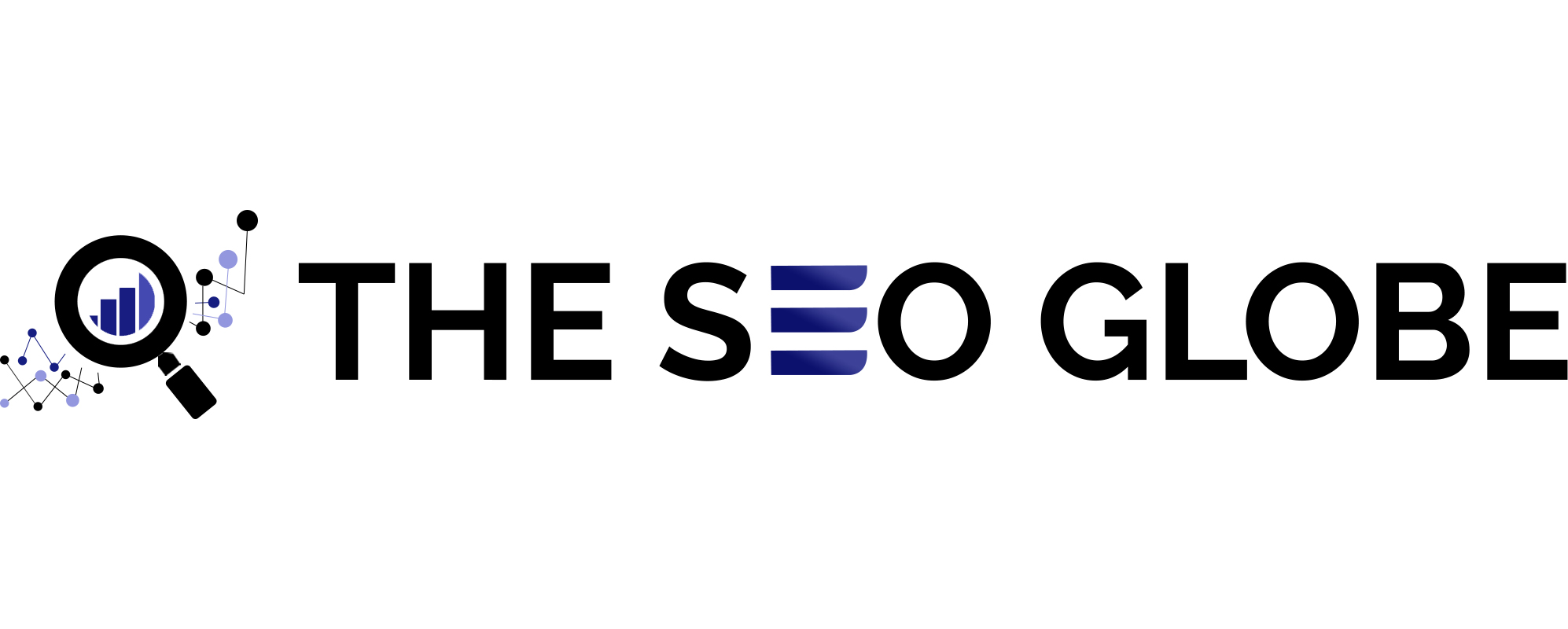
If you’re one of those pros who has a fair understanding of what is SEO and how important it is for all the online verticals, you may straight away skip to the Chapter 2 which talks about How Search Engines Work and Getting Familiar With Crawling, Indexing & Ranking. But yes, it is always good for the SEO experts to revise the basics and find out if there is anything that has changed or newly introduced in the SEO space.
Through this chapter, our objective is to make you familiar with the basics of SEO in the easiest to understand manner.
What’s SEO? A Quick Recap
In our SEO Guide For Beginners, we learnt what is SEO. And here’s just a quick recall along with some more additions to help you understand ‘SEO’ better.
The full form of SEO is Search Engine Optimization. It is the process of amplifying the quality as well as quantity of the website traffic, thereby giving more exposure to your portal/brand through organic (non-paid) search results.
Apart from the SEO definition given above, what matters a lot in the practice of SEO are — the customers. Yes, customers aka the people who type queries and search for their answers on search engines. If you are aware of what your audience is looking for and you have ready solutions to offer them, the SEO game is all yours.
To be an SEO expert, you have to understand what your customers are searching online, what words they are using to search those queries, what answers they are looking for and what type of content they want to consume.
SEO Success Factors
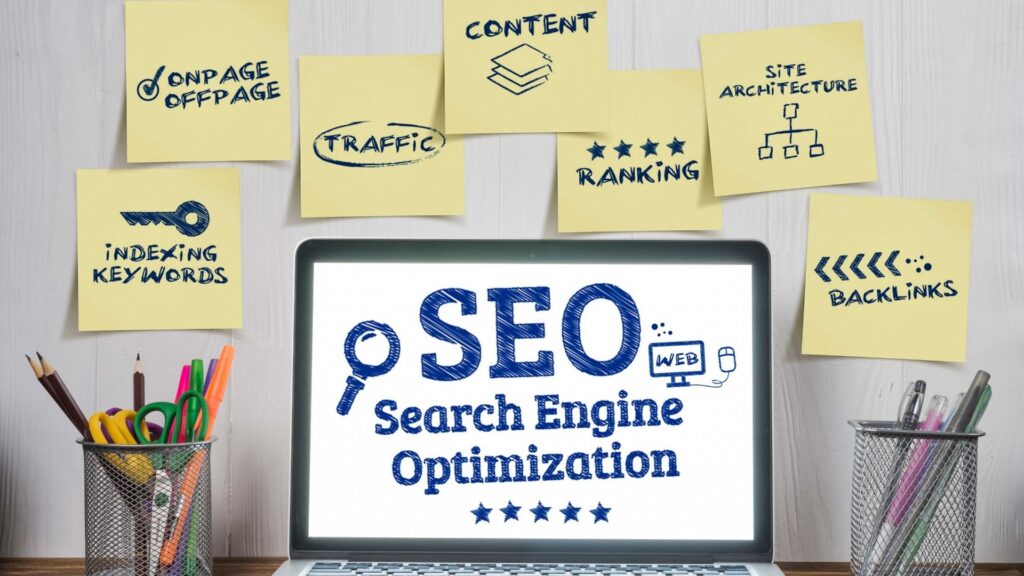
In this chapter, we will be covering in detail how search engines work, why people search, what are organic search results and the importance of SEO. But, before we proceed to the aforementioned topics, let us understand what are the key SEO success factors and how can you leverage them to boost your website rankings. Also, here in this section, we will understand which are the negative factors that you need to be aware of in order to safeguard your website from losing its rankings.
The success of your website depends on two key SEO factors, i.e. On-Page SEO and Off-Page SEO. Now, let’s understand them both in detail.
What is ON-Page SEO?
On-page SEO can be done within your website and it primarily includes optimizing your website’s structure, html and the type of content published on the web pages.
Best On-Page SEO Practices
For an effective ON-page optimization of your website, you have to ensure the rightful execution of the following On-Page SEO practices:
Focusing on Content
It is rightly said that “Content is King”. And there’s a big reason for this quote, especially in the SEO space. Today, for the search engines to understand and rank your website, content plays a key role. Let us find out what all you need to be aware of to produce and use the content rightly for your On-Page activities:
- Content Quality – Publishing high-quality and valuable content for your audience is a must. It is always good to come up with content that is engaging as well as informative from a user’s point of view. Also make sure that the content to be published on your website is error-free — no grammar and spelling mistakes!
- Topic Research – Topic research as well as competitor research are two other key factors to utilize your content to improve the On-page presence of your website. On a topic that is already covered by your competitor, if you have high-quality content with more information, you’re very likely to rank higher in the days to come.
- Keyword Planning – As an SEO professional you should be putting your consistent efforts to research keywords that can be included in the content topics so that you’re more likely to welcome the visitors through the search terms that they enter/type on the search engines. Another good practice is to find the synonyms of the topic that you are covering and include them very naturally in the content.
- Fresh and Branded Content – For your target audience, it is always important to get the content created on the topics that are more engaging or popular. Also, you have to constantly come up with the content that is branded and solely yours. This will not only help your website rank higher in the search engines but will also give more credibility in the vertical. It is also advisable to cover the trending as well as the evergreen topics.
- Multi-Search Engine Visibility – Make sure that content is provided to all the relevant search engines. Also ensure that all the images are optimized with the alternative text so as to increase the chances of visitors coming to your website through search engine image views. Also list your business on Maps and Local listing channels such as Google Maps/Bing Maps and Google My Business. For publishers, it is good to include articles on News platforms like Google News. Those selling products should consider platforms like Google Shopping to boost sales.
HTML
HTML is another key attribute when it comes to executing the On-Page SEO. It covers all the aspects of a website related to the HTML and codes. It underlines the focus on a more visually attractive and hassle-free user-experience by developing the codes further and structuring the website more efficiently. Let us understand what all you should be aware of to mark your website’s strong on-page presence:
- Page Titles – To scale up the rankings of your website, it is very important for you to give each of your website’s web page a dominating presence. And for this, you need to start giving suitable titles known as title tags for all the web pages present on your website. While writing a title for a webpage, make sure that you add relevant keywords that define the objective of the page. Moreover, it is also very important to make the page titles or SEO titles prompting enough to attract the attention of the users on SERPs.
- Page Descriptions – Along with the title tags, writing page descriptions in the meta description tags is also very important to improve the On-page SEO of your website. While writing a description in the meta description tag, make sure that you provide a brief and clear explanation about your content that gives readers a brief understanding of the landing page, its objective and solutions.
- Page Headers – Managing the page headers is another important task to scale up the on-page SEO quality. All the content pages of your website should be well arranged with the header tags such as H1, H2 and H3 for the convenience of a viewer. A rightful execution of header tags would justify the header hierarchy thereby returning you SEO benefits. Besides this, it also enhances the readability for a viewer.
- Structured Data – This emphasises on making your search engine listing more attractive by additional information on the pages, such as rich snippets, schema and reviews. When things like reviews and rich snippets appear on the SERPs, they add more credibility to your site thereby prompting users to visit it.
Site Architecture
Improving website architecture is also very important to raise your site’s score on the On-page SEO front. Adapting your site in the right architecture allows bots as well as users to navigate through all the web pages easily. Let’s have a look at all the necessary attributes that lead to improving the architecture of your website:
- Crawl-Friendly Site – A site should be easily crawlable by bots. If a content displayed on a website is arranged well and is easily accessed by its users, it is quite likely to be accessed by the crawlers too.
- Mobile-Friendly Site – This refers to having a responsive web design that can be easily translated when run on the mobile devices. Google’s algorithm update, Mobile-First indexing also emphasizes on the same. We will discuss the Mobile-First indexing in a later part of this chapter.
- Site Speed – Internet users want to access information as soon as possible. And therefore, it is relatively important for every website that answers to the queries of the users are served at the earliest. Always ensure that your site speed and performance are optimum. Keeping your site speedy not only helps users to access the information faster but it also helps in boosting your rankings. On mobile devices, it is ideal to make your site load faster than 3 seconds. As an SEO expert, you can always use Google’s site speed testing tool to check the current speed status of your website.
- Friendly URLs – It is necessary to have URLs that can define the topic of the web page very clearly. For e.g. www.theseoglobe.com/seo/free-seo-analysis. Here, in this URL, you can see that the website has defined the objective of the page within the URL itself. And, the user, as well as search engines, can get an idea from the URL itself that the page is created for the users to the get free SEO analysis report for their websites.
- No Plagiarism – Another important attribute to strengthen the on-page SEO of your website is by putting unique or plagiarism-free content on the pages. Never post duplicate content neither from other websites nor from your own website pages. Ensure that the content is not plagiarized and the uniqueness of each and every page of your website is maintained.
What is OFF-Page SEO?
Off-Page SEO relates to the execution of SEO practices outside your website to build trust, authority and establish relevance. Things like adding your business information to maps and social media channels, showcasing your website links on other reputed websites are a part of Off-Page SEO.
Best Off-Page SEO Practices
Along with the rightful execution of On-page SEO, you also have to ensure that your Off-page activities are seamless and perfect enough to return relevancy to your business through search engines, build trust and help your website gain better authority in the online space. Following are the Off-Page practices that an SEO professional must include in his to-dos:
Links
Building or gaining links (backlinks) is one of the most important ways to achieve Off-Page SEO success. From the search engines’ point of view, backlinks indicate the quality of a site’s content linked to an external web page. A site that has multiple high-value backlinks is very likely to rank better when compared to an equivalent site with lesser backlinks. Let us find out what all should you keep in mind while planning for a great backlinking strategy:
- Link Quality – Always make sure that you get links from credible sources. If sites with higher domain authority give you a backlink, it is in itself a great communicator to search engines like Google that your website is a great source of information. Thus, quality backlinks increase your chances of ranking higher on search engines.
- External Webpage Topic – An ideal backlink is the one that comes from the web page that has content representing the vertical or topic of your website. This hints to Google that your site has the authority on the subject.
- Number of Links – It basically refers to the number of times other websites have linked your domain to their web pages. If backlinks come from domains that have high authority, your website is very likely to rank higher on search engines.
Trust Factors
One of the key objectives of Off-Page SEO is to build the trust of the domain among all the search engines. And for this, an SEO practitioner should be aware of the following:
- Site History – As compared to a new website, an optimized website that has been hosted for a longer tenure receives an advantage of getting more trust from search engines like Google, thus increasing its chances of ranking higher.
- Authority – Reviews and quality links received from external websites will help your website to build its authority. Always make sure that your site gets quality backlinks, as mentioned above, and that it always gets positive reviews from platforms such as Google Reviews, Trustpilot, Facebook Recommendations etc.
Social
Social media is also instrumental in scaling up your Off-Page SEO. The present-day social media channels behave more like a search engine and hence, if capitalized rightly, they can return you humongous results. Here’s how you can utilize your social channels for your off-page strategy:
- Building Reputation – Utilizing social media can establish your brand/domain as a reputable source and it possibly can send readers of your social channels to your website thereby increasing traffic and generating potential leads. Ensure that you optimize all your social media posts to leverage this.
- Increasing Shares – Shares on social media are very likely to prompt people to visit your website. Content shared on channels like Linkedin and Twitter has a high value.
Focus on Personalisation
Personalization is another key focus area which you should consider while planning your website’s Off-Page SEO strategy. Personalization could be based on the following:
- Locality – It is very important for you to focus on localities and areas for which your content is relevant. Search results these days are personalized to users’ locations such as towns, cities and states, and therefore, working on the local SEO of your website becomes really important. Especially, if you want to cater your content, business or services to some specific areas.
- Country – Similarly, search engines like Google also consider which countries your content is suitable for. And therefore, if your content is meant to serve the needs of people outside your native country, you should start focusing on international SEO.
We can add this in backlink topic :
- Create shareable assets on your website like Info-graphics, Ebooks, Guides, Quality article. The more people will like and share your assets on their websites, blogs etc, The more backlinks you will generate. That too very authentic.
Don’t Do This Ever! Harmful Factors and Practices to Avoid in SEO
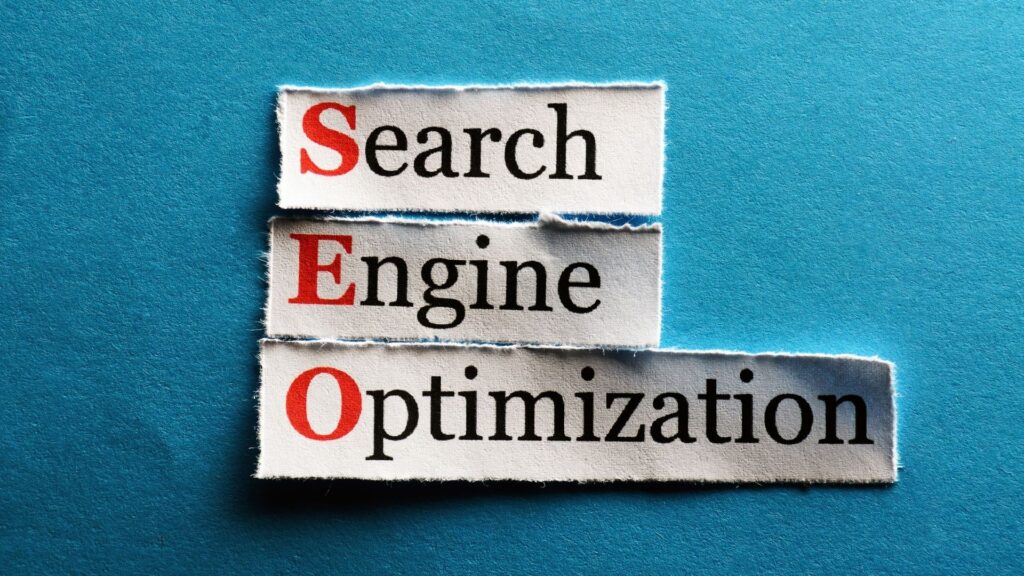
In this section, you will know which are the negative factors and practices you need to avoid as an SEO professional. These practices are very likely to harm your search engine rankings, downgrade your online reputation and in certain cases might even shut down your website. Therefore, kindly go through the below-mentioned harmful factors and practices and make sure that you never make them a part of your SEO planning:
- Bombarding Ads – Always ensure that the content of your website is never surrounded by too many advertisements and the ads do not block the viewer from viewing the content.
- Thin Content – Avoid publishing pages with no or “thin” content. Always ensure that the pages have a decent amount of content placed so that a viewer can understand what your page is about, very clearly.
- Keyword Stuffing – This is another cheating SEO tactic, also called over-optimization. Avoid using the same keywords too many times on a single web page. Search engines like Google are now smart enough to catch the pages with keyword stuffing and may even penalize your site for this.
- Hiding Keywords & Content – It is advisable not to hide keywords or text in the same colour as the page background. All your website content should be clearly visible to the users. Ultimately, your objective is to inform the user more about a specific topic, right? Then why hide the content.
- Paid Links – This is another negative SEO practice that can harm your website. Never purchase links from another website. Let the links be created naturally. Buying them might have an adverse effect on your website. PRs are a smarter way to gain links without being penalized.
- Spamming – Avoid spamming on other forums, blogs etc. just to grab more visitors. By doing this, you are not only irritating people but also trying to gain links artificially.
- Cloaking – Cloaking is another malpractice you should always avoid as an SEO expert. Moreover, you should also suggest your IT team never to execute cloaking on any of your web pages. For those who want to understand cloaking; it is a practise which refers to showing different content or URLs to humans and search engines. Google’s Webmaster Guidelines define cloaking as a violation as it displays search engine users with different results than expected.
- Plagiarism – Never copy the content already published on other websites. Posting duplicate or copywritten content may not only downgrade your rankings but could even take you off the search engines entirely.
What’s Mobile-First Indexing by Google?
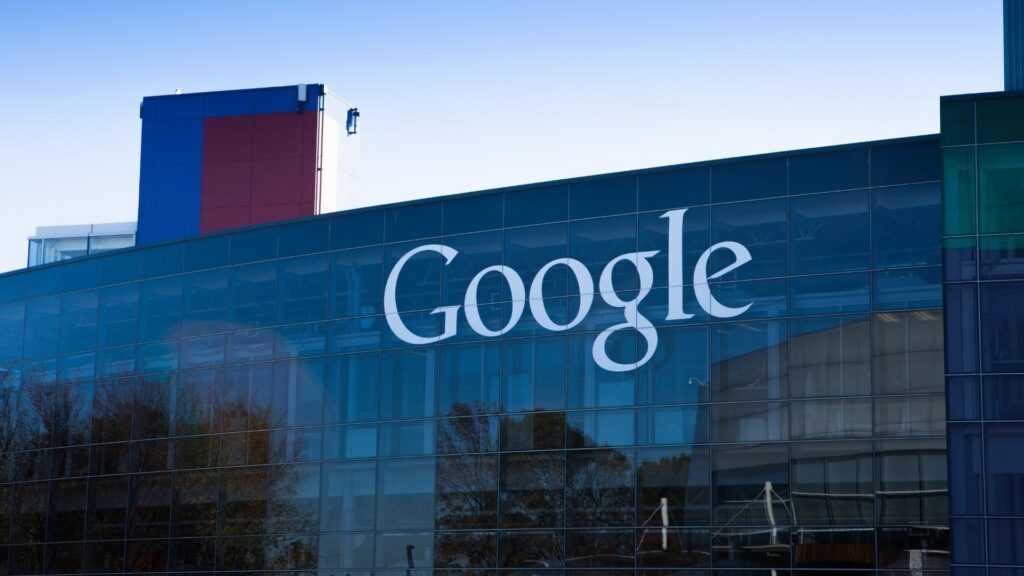
Although mobile phones got recognized by a majority of masses starting 2005, but it was with the beginning of the year 2011, mobile devices industry witnessed a major boom, especially with the growing numbers of smartphone sales. The growth of users who adopted smartphones led to a humongous increase in the searches for ‘businesses’ and ‘things’ on the move.
It was in 2015 when mobile phone searches on Google were recorded higher as compared to the searches done on desktop devices. It was in the same year when Google came up with mobile-friendly algorithm with the objective to give its users the most relevant and timely results.
To further enrich the experience of mobile search engine users, in 2016, Google introduced the Accelerated Mobile Pages (AMP). Content on AMP loads faster as compared to the standard web pages, serving content instantly to the user. AMP is these days widely adopted by the news & media websites.
Mobile-First Indexing introduced by Google predominately focuses on the use of the mobile version of the content for ranking and indexing. Earlier, while evaluating the relevance of a page in response to a user’s query, Google used to index the desktop version of a content placed on a web page. Now, as the majority of users search on Google through mobile devices, the Googlebot primarily indexes and crawls the smartphone pages. Since 1st July 2019, mobile-first indexing was made default by Google.
Nowadays, as mobile-first indexing is the first preference by Google, websites are now eyeing to bring their rankings up by introducing techniques such as Responsive Web Design, AMP etc.
Getting familiar with the basics of a Search Engine

Before we start getting familiar with the basics of a search engine, it is very important for you to know what is a search engine?
A search engine is an answering machine that checks billions of content pieces and assesses thousands of factors to decide which piece of content is most likely to answer the query asked by a search engine user. A very good example is Google, the most popular search engine across the globe.
The content pieces that a search engine checks to answer a user’s query could be in the form of web pages, videos, images, PDFs etc. It is through the process of crawling and indexing that the content pieces are discovered and catalogued on a search engine. Once a user submits a query, the search engine looks for all the crawled and indexed content pieces in its database, and the most appropriate piece of content is then shown to the user in the most relevant order on the Search Engine Results Pages (SERPs). The order in which results for a user’s query are shown is known as ranking.
There are many search engines quite popular these days, some of which we have discussed in a later part of this chapter.
Why People Search?

There was a time when people used to type words on a search engine and look for the documents that contained similar words. Today, things in the search space have changed a lot. Today’s searcher comes on the internet to do something, to solve his problems and to accomplish tasks. Bill Gates said in 2009 that the future of search will be “verbs”. And that stage has come!
Today’s searcher searches to BOOK a movie ticket, to BUY a mobile phone, to LEARN the lyrics of a song etc. Like Bill Gates said, searchers of the present day are more verb centric or, you can say they perform actions.
In a marketing language, today’s user starts his “consumer journey” with a search. The beginning of this consumer journey can also be termed as the inception of the funnel wherein a consumer leads to awareness and then, to consideration, followed by a purchase.
What do you mean by Organic Search Results?
Organic Search Results, unlike the Paid Search Results (advertising), can only be earned with the best SEO practices. Earlier, during the beginning of this decade, organic search results were very easy to spot on the SERPs as the ads running on the search engines used to be clearly labelled. For anyone, who was looking for organic results, it was easy to identify the typical 10 blue links listed on the SERPs.
However, things with the time have slightly changed and you would now also see many PPC ads or Click to Call ads (as shown in the image given above) running on the same search engine results page with a very small “Ad” box, placed right in front of the website URL. Both, the ads as well as organic results look very similar on the SERPs these days. And for common internet users, it is very hard to identify which results are organic and which results are paid, until and unless they notice the small “Ad” box in front of the website URL.
It’s quite obvious that advertising is one of the primary sources of revenue for search engines. Thus, advertisements are very intelligently placed on the SERPs so that a search engine’s clients (those who do paid campaigns on a search engine) are also catered the best results. Apart from this, a search engine’s another key objective is to solve searcher’s query within the Search Engine Results Pages (SERPs) very quickly so that users build trust for it and use it repeatedly.
Featured Snippet:
Answer Box:
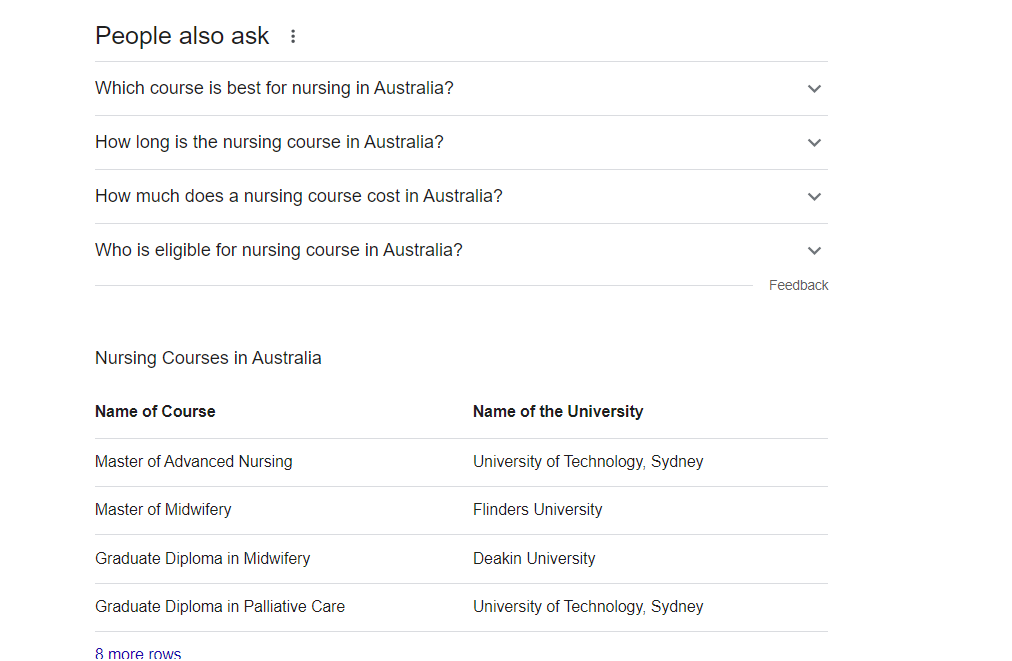
The present-day SERPs have been incorporated with new formats of dynamic organic results, called SERP Features. Popular examples of SERP Features are featured snippets and answer boxes (as shown in the above image). Take an example, you want to know nursing courses in Australia and to search this query, you type the keyword Nursing Courses Australia. Now, in this case, Google will show you a Featured Snippet box (as shown in the image given above) fetching a trusted source’s web page, which contains the list of universities and nursing courses that are offered in Australia. This, from a user’s point of view is quite convenient, isn’t it?
As far as the paid campaigns on a search engine are concerned, an SEO practitioner doesn’t have control over them, but yes, to an extent SERP Features like Featured Snippet, Answer Boxes etc. can be influenced by smart SEO practices. If your content ranks on a featured snippet (as shown in the image above), you will receive a higher number of visitors to your website. And how to rank on zero position or featured snippet, that we will discuss in a separate article.
Apart from featured snippets, the organic search results are also displayed in the form of People Also Ask boxes, Quick Answer/Tools, Carousel, Top News Stories and Knowledge Card.
Importance of SEO
The availability of social media, paid advertising, and many other online platforms have generated a huge scope to get traffic to the websites, but still, the online traffic is majorly ruled by the search engines.
As compared to the paid advertisements, organic search results receive more clicks, have better digital real estate and look more trustworthy to savvy internet users. Hence, you will have to master the skills and techniques of SEO that take you to the gateway of organic search results. There’s another interesting fact to complement this; out of all the searches that have happened in the US between November 2015 to October 2017, only 2.8% people clicked on paid advertisements (data as per Moz.com). Moreover, as compared to PPC, on both desktop and mobile, SEO can help you gain 20X more traffic. Sounds good? How about rolling your sleeves to learn more about SEO in this ‘SEO 101 Guide’?
If you set up your SEO goals correctly, it can turn out to be a real money saver. Let’s understand how. You plan to develop a piece of content that rightly targets your audience, has the right set of keywords placed in a very natural tone (not that age-old keyword stuffing). And, your content developers put in their heart and soul in making that piece of content worth deserving with proper detailing, spacing, bullets, appropriate headers etc. to rank on search engines. All this is very likely going to attract a big audience that can further lead to your conversion goals. Doing the same through paid advertising would require continuous funding to send traffic to your website.
Every SEO learner should be aware of the fact that website optimization leads to delivering and communicating better information to search engines, thereby enabling the content/web pages to get properly indexed and appear within the search results.
Remember, the search engines of this generation have become very smart. And in the coming future as well, they will keep upgrading. Therefore, you, as an SEO practitioner, have to be well prepared and consistent in making your website impressive enough to attract the search engines. And to ensure that you’re well prepared as an SEO practitioner, make sure that you stay updated to Google’s new algorithm updates. Furthermore, for SEO learners, we have also added the webmaster guidelines of Google and Bing (two popular search engines), later in this chapter.
SEO For Your Business: Who Should You Hire? A Professional, A Consultant or An Agency?
To manage SEO for your business, you have to choose the resource after understanding your bandwidth and the website’s complexity. If you have the willingness to learn SEO and you find that your website isn’t complicated enough, you yourself can start optimizing your website. For e.g., if you are a food blogger and you have your own blog built on a platform like WordPress, you yourself can start learning and executing SEO. Furthermore, our SEO guide for beginners can be a comprehensive source for you to learn and implement SEO successfully.
You may also onboard an SEO expert in-house or as a consultant to accomplish optimizing tasks for your website. He will handle the complex issues of your website better, dig data and rank your website higher. Other than an SEO expert, you may also look forward to hiring an agency. There are many agencies who provide SEO services, but their work quality may vary. It is very necessary for you to know that the agency you wish to hire, doesn’t practice harmful SEO techniques to rank the websites higher. Otherwise, your website may have to bear the brunt of a dip in rankings.
White Hat vs Black Hat SEO: What’s the difference?

White Hat SEO refers to employing SEO techniques, strategies and best practices that obey the search engine guidelines and primarily focus on delivering more value to people.
On the other hand, Black Hat SEO includes techniques and strategies that are exercised to spam or fool the search engines. Adopting the path of Black Hat SEO may bring results, but it could be highly dangerous for your website. Black Hat SEO may bring a lot of risk to your website, penalize it or/and de-index it from search results.
Adopting ethical ways to rank your website higher is always good.
But wait! There’s something called Gray Hat SEO. Some call it a smarter way.
Gray Hat SEO, like Wordstream.com defines, is an SEO practice, slightly riskier than White Hat SEO, but it may or may not result in your website being banned from search engines or affiliate websites. Basically, it isn’t as pure as White Hat SEO and isn’t as horrifically manipulative as Black Hat SEO.
Top 10 Search Engines SEO Learners Should Be Aware of
When we talk about search engines, the name Google comes first to our minds as it has the largest share in the search engine space. But do you know that other than Google, to rank your content, there are many other search engines which you should also consider as an SEO professional?
Let’s check out the top 10 search engines that every SEO learner should be aware of.
- Google
Google is undoubtedly the leader among all the search engines across the globe. With 92.19% share in the search engine market, Google tops the chart in the popular search engines’ list. - Bing
Bing was introduced by Microsoft in 2009, replacing MSN Search. After the introduction of Bing (against Google), it has grown well, primarily after being amalgamated with Yahoo search. Today, as per Statcounter.com, Bing has a global search engine market share of 2.61%. - Yahoo!
Yahoo is another popular search engine which is known as one of the popular email providers across the globe. It currently has a worldwide search engine market share of 1.85%. As per Alexa and Similarweb, in 2016, Yahoo was the most read news and media website, having more than 7 billion views per month. - Baidu
Introduced in the year 2000, Baidu is a popular search engine in China and holds more than 82% share in the Chinese search market. However, globally, it is not as popular as the other aforementioned search engines, but within the Chinese region, it receives more than 3.3 billion searches every day. The global search engine market share of Baidu is 1.21%. - Yandex.ru
Yandex, also known as Yet Another iNDEXer, was introduced first by two Russian developers in 1990 and later in 1997, it came as Yandex.ru domain. It has a worldwide search engine market share of just 0.55%. - DuckDuckGo
DuckDuckGo, often abbreviated as DDG, is another popular search engine which is headquartered in Pennsylvania, US. This search engine emphasizes to protect searchers’ privacy. This search engine has a global search engine market share of 0.54%. - Ask.com
Ask.com is although not a mainstream search engine like the above-mentioned search engines, but its question and answering format has gained it approximately 0.42% of search share (as per reliablesoft.net). - AOL.com
AOL is an old-time search engine which still continues to make itself in the list of Top 10 search engines of the world. As per netmarketshare.com, 0.05% of visitors still refer to Aol to find answers to their queries. - Wolframalpha
Wolframalpha is not the traditional search engine but more like a Computational Knowledge Engine which is capable of answering facts and data for a number of topics. - Internet Archive
Archive.org or Internet Archive is an archive search engine which allows you to find out how a website looked like since 1996. For SEO practitioners, it is a very useful tool as they can change how a particular website has changed over a period of years.
Note: Search engine stats are for the period of July 2018-July 2019 for the first 6 search engines. Search market data sources are Statcounter.com and Reliablesoft.net.
Search Engine Goals and the SEO Industry
Every search engine wants you to succeed in your purpose. It could be to help you gain better attention as a business or it could be helping you to gain better knowledge, or maybe, it could be by assisting you to buy a required product/service easily.
As far as the relevance of search engines with SEO practitioners is concerned, they want you to be the rightful executers of helping websites achieve better results and rank better. The largest search engine, Google has its own Search Engine Optimization Guide, which is meant to educate SEO beginners on how to initiate with search engine optimization.
Other than this, popular channels like SearchLove, MNSearch, Unbounce, SearchEngineJournal, ContentMarketingInstitute, Moz etc. organize many digital marketing conferences, which will help you to sharpen your expertise in the field of SEO. We advise you to regularly keep a tab on the upcoming digital marketing events near your vicinity.
Furthermore, Google’s Search Console Help Forum helps SEO professionals to deal with day to day SEO issues.
Knowing Google Search Console Guidelines
Basic principles that you should be aware of:
- Always make sure that you make pages for users, and not for search engines.
- Never ever deceive your users.
- Avoid harmful tricks to rank your website higher. Keep your users in mind always.
- Rather than shortcuts, always brainstorm on making your website engaging, unique and valuable.
Know what to avoid:
- Avoid automatically generated content.
- Avoid participating in link schemes.
- Say ‘NO’ to cloaking.
- Avoid creating pages that have little or no content.
- Do not hide links or text.
- Say ‘NO’ to sneaky redirects.
- Say ‘NO’ to scraped content.
- Avoid creating doorway pages.
- Do not load pages with irrelevant keywords.
- Do not create pages that are malicious in nature.
Knowing Bing Webmaster Guidelines
Basic principles that you should be aware of:
- Focus on providing content that is easy to find, deep, clear and engaging.
- Page titles of your website should be clear.
- As links denote signal of popularity, Bing rewards for the links which are organically gained.
- Social shares and social influence have positive signals in Bing’s organic rankings.
- A useful and positive user experience along with page speed help in improving rankings.
- Ensure that images have alt text described so that Bing can understand the content better.
Know what to avoid:
- Say ‘No’ pages that have thin content, have plenty of affiliate links or redirecting users to different websites.
- Say ‘No’ to duplicate content.
- Avoid keyword stuffing.
- Avoid ‘cloaking’ tactics.
- Create URLs that are short, keyword-rich and do not have non-letter characters.
- Say ‘No’ to buying links and participating in link schemes.
Google Guidelines to Represent Your Local Business

If you work as an SEO specialist for a business which operates locally and is either engaged in getting customers to the store or servicing them at their locations, then listing on Google My Business becomes very essential. And for local businesses, Google has given some guidelines; the dos and don’ts that you should consider while managing or creating these listings.
Basic principles that you should be aware of:
- Make sure that you are eligible for listing your business on Google My Business. You must either have a physical address of your business where your customers can step in. If you operate from home, it doesn’t matter, but you must either be serving your customers at your doorstep or at their locations.
- Make sure that you never list anything false about your business. Be honest and write accurate information about your business such as address, telephone number, hours of operation, business categories, website address etc.
Know what to avoid:
- If not eligible, never create a business listing
- Never misrepresent the core information about your business. Do not stuff your business name with service keywords or geographic location. Also avoid creating listings for fake addresses.
- Do not use virtual offices or PO boxes in place of physical location.
- Do not post fake positive reviews about your business or fake negative reviews about your competitors.
Understanding and Fulfilling User Intent
So, you now have a fair understanding of how the world of SEO behaves, how search engines function, which are the key essentials to rank your website higher. You also got a brief idea about Google Webmaster Guidelines and Bing Webmaster Guidelines. Let us now learn how understanding and fulfilling user intent quite essential for an SEO professional.
When a user goes on a website, he has his own objective, or say the desired outcome. He could be looking for a solution to book his air ticket, to listen to his favourite track online, or it could be something else.
You as an SEO professional must keep these above-mentioned webmaster guidelines in mind. And rather than violating search engines’ guidelines to achieve higher rankings, focus on fulfilling the user’s intent i.e. his purpose to visit your website.
If a person performs a search for “food”. Is he looking to get the food delivered, wanting to know how to cook food, looking for nearby restaurants, or is it something else?
You as an SEO expert should know how to serve a user the content which he is looking for and the format that he wants to consume.
Let’s have a look at the common user query or intent types:
- Informational – An informational query is also known as a ‘know’ query. When a user is searching for information, wanting to know about a particular subject, it is an informational query. For e.g. Where is the Taj Mahal located?
- Transactional – A transactional query is also called a ‘do’ query. When a user is searching to buy something, it is known as a transactional query. For e.g. Buy smartphone online.
- Navigational – A navigational query is also called as a ‘go’ query. This query is for a typical brand or a known entity. For e.g. user searching for ‘Nike’. In this case, serving a user an alternate brand ‘Reebok’ will not fulfil his intent.
In your vertical, to fulfil the purpose of query seekers aka users, you must find out what type of content your top-ranking rivals are providing which you are not serving to the potential audience. Once you gauge this, just think how on your website can you offer 10X value to a user.
It is often quoted in the SEO industry that a content which is more relevant and high in quality is very likely to rank higher on the SERPs. Besides ranking higher, it will also build trust and credibility among the online audience.
And to execute all the above-mentioned techniques, you should very well understand the goal of your website or client.
Understanding the Goals of Your Website/Client

All websites differ from each other, hence it is very important for you to understand the business goals of your company/client’s website. For you as an SEO professional, understanding the business goals of a website will help in gauging the areas of SEO you need to focus on and it will also give you an understanding of where to track your conversions from.
Apart from this, another advantage of knowing your site’s business goals is that it helps in setting benchmarks for the future. As a professional, you will be more confident while talking to your clients or bosses, if you are thoroughly aware of the site’s business goals.
Knowing Key Performance Indicators (KPIs) is also very important as they help you to measure the return on SEO investment. You should be very clear about your KPIs as they help you and your bosses to measure the success of the organic search efforts done on your website.
Let’s have a look at some very common KPIs:
- Sales
- Phone Calls
- Subscriptions
- Contact Form Submissions
- Downloads
Those who are managing local SEO through Google My Business should have a fair understanding of the following KPIs:
- Website Clicks
- Call Button Clicks
- Driving Direction Clicks
For SEOs, ‘ranking’ and ‘traffic’ are crucial but they need not be the part of KPIs. You might be wondering that you have been learning in this guide a lot about increasing rankings and traffic, but why are we saying that they need not be the part of KPIs. Right?
So, just to elaborate this, ranking isn’t worth achieving if people aren’t clicking to your website. Similarly, traffic that has very little or no conversion is not justifying at all.
Now, here’re two situations just to understand this better:
(A) With a monthly traffic of 10,000 visitors, 3 visitors buy products from your site.
(B) With a monthly traffic of 10,000 visitors, 110 visitors buy products from your site.
Which of the above-mentioned situations did you like?
Of course situation (B)!. Why? Because more people are buying products from your site, and the conversion rate in the situation (B) is higher.
Business goals should be laid out first and then SEO should be used to accomplish those goals. This is how you’re going to achieve success online.
Proceed on to Chapter 2 to learn in detail how search engines work and also get a fair understanding about Crawling, Indexing and Ranking.

